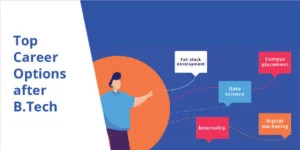One of the most common options for students seeking higher education in engineering is the Bachelor of Technology (B.Tech) program. This four-year undergraduate degree offers a comprehensive range of Courses in B.Tech designed to develop students’ technical knowledge, practical skills, and problem-solving abilities. However, with the abundance of branches and specialisations available, many students frequently ask themselves, “Which course is best for me?”
Let’s examine the main B. Tech courses, new specialisations, and how to make the best career decision in this blog.
1. Core Courses in B.Tech

These are the traditional engineering branches that have been in demand for decades. They form the backbone of technical education and continue to offer vast career opportunities across industries:
1. Information Technology (IT): Focuses on computer systems, databases, software development, and network management. IT engineers play a key role in areas like web development, mobile applications, cloud services, and IT consulting.
2. Computer Science and Engineering (CSE): Deals with programming, algorithms, data structures, artificial intelligence, and emerging technologies in software.
3. Electronics and Communication Engineering (ECE): Involves the study of circuits, microprocessors, communication systems, and embedded systems.
4. Electrical and Electronics Engineering (EEE): Concentrates on power systems, electrical machines, energy production, and smart grids.
5. Mechanical Engineering (ME): Covers design, manufacturing, thermodynamics, robotics, and automotive technologies.
6. Civil Engineering (CE): Specialises in construction, structural design, infrastructure development, and urban planning.
7. Chemical Engineering (ChE): Deals with chemical processes, manufacturing industries, and energy production.
2. Emerging & Trending Courses

With technology evolving rapidly, new Bachelor of Technology specialisations are becoming popular:
- Artificial Intelligence & Machine Learning (AI & ML)
- Data Science and Big Data Analytics
- Cybersecurity
- Internet of Things (IoT)
- Cloud Computing & Blockchain Technology
- Robotics & Automation
- Biomedical Engineering
These courses align with modern industry needs and offer high-paying career opportunities.
3. Interdisciplinary Courses

Some students prefer a mix of fields, leading to interdisciplinary options such as:
- Mechatronics Engineering (a combination of mechanical, electronics, and computer engineering)
- Biotechnology Engineering
- Aerospace Engineering (a combination of several core engineering fields)
- Automobile Engineering
- Marine and Petroleum Engineering
- Environmental Engineering
4. How Do I Choose the Right B.Tech Course?

When choosing a Bachelor of Technology course, consider the following factors:
- Interest and Passion: Choose a branch about which you are genuinely curious.
- Future Scope: Consider industry demand, professional advancement, and employment options.
- Set: Some courses need advanced coding abilities, whereas others focus on design, building, or mechanical.
- Higher Education & Research Opportunities: Certain fields provide excellent opportunities for an MS, MBA, or PhD.
5. Career Scope After B.Tech

After earning a B.Tech degree, students can:
- Apply for positions in information technology, manufacturing, construction, research labs, or government.
- Pursue higher education (M.Tech, MBA, MS overseas).
- Discover entrepreneurship and start-ups.
- Prepare for competitive examinations such as GATE, UPSC, and PSU recruitments.
Conclusion
Bachelor of Technology courses provide students with a wide range of job options in technology, engineering, and innovation. The goal is to discover your interests, match them with future trends, and select the appropriate specialisation. With businesses turning towards automation, artificial intelligence, and sustainable technology, engineering graduates have an unprecedented opportunity to define the future.






